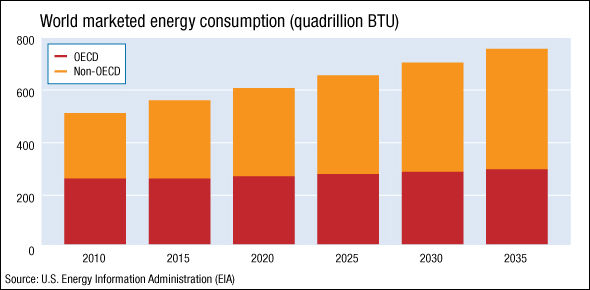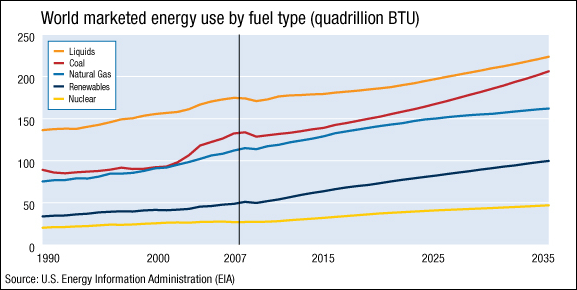World energy consumption will increase 49% in the next 25 years, driven
by rapidly developing countries such as China and India, the Energy
Information Administration said the week ended May 28.
EIA, the statistical arm of the Energy Department, said in its
"International Energy Outlook 2010" report unveiled May 25 that
hydroelectric and wind power would be the two fastest-growing sources of
world energy supply through 2035.
But coal, oil and other fossil fuels will still provide more than 75% of
total global demand in the period, EIA said.
"Renewables are the fastest-growing source of energy, but they start
from a relatively low base," said Howard Gruenspecht, EIA's deputy
administrator, in unveiling the report at the Center for Strategic and
International Studies in Washington.
Developing nations that are not members of the Organization of the
Economic Cooperation and Development, or OECD, will account for 87% of
the increased energy consumption out to 2035, EIA reported.
EIA estimated that oil prices, which are now hovering around $70 per barrel, would average $133/b by 2035.
But EIA cautioned that prices could soar as high as $210/b or drop to as low as $51/b depending on certain supply and demand factors, as well as efforts to develop ethanol and other non-petroleum biofuels.
EIA forecast a similarly wide range of oil prices last year.
The global recession has broadly dampened demand and production of all energy sources in the last two years, but EIA sees both demand and consumption jumping back up to pre-recession levels by 2035.
EIA's forecasts assume the US will not enact any major changes to US energy policy, such as passing the controversial energy and climate-change bill currently pending in the US Senate.
The forecasts also ignore President Barack Obama's decree that the US will not approve any new offshore oil and natural drilling until authorities determine the cause of the massive oil spill in the Gulf of Mexico.
Much of the strong forecasted growth in renewables was based on existing policies, passed by the federal government and the states, mandating renewable energy use, Gruenspecht said.
Plans to mandate renewable energy use at the federal level have generally stalled, although Obama and the Democratic-led Congress succeeded in writing significant tax credits and federal support for renewable energy producers into the economic stimulus bill that Congress passed more than a year ago.
World marketed energy consumption: 2010-2035

World marketed energy use by fuel type: 1990-2035

|